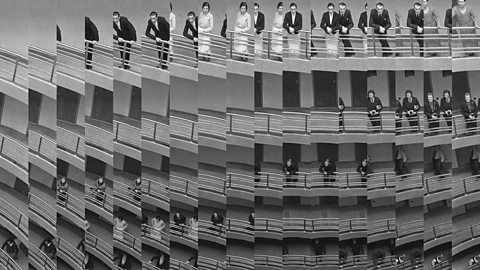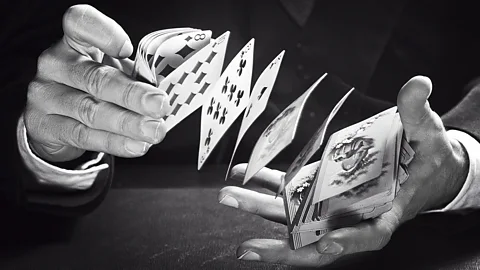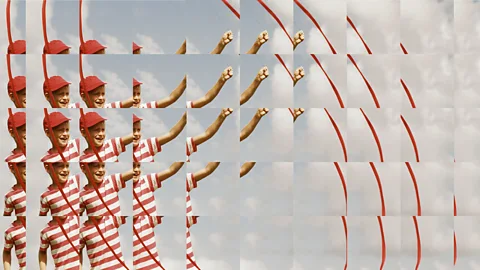How did time begin, and how will it end?
 Edouard Taufenbach/Bastien Pourtout
Edouard Taufenbach/Bastien PourtoutMost things have a beginning and an end, including time itself. What was the spark that made it begin, and what will one day bring it to an end?
One of the pleasures of a show like Doctor Who that features near-unlimited time travel is that it can go anywhere and anywhen. That includes going to cosmic extremes.
On multiple occasions the Doctor has gone billions of years into the future, to the end of the Universe. The Tenth Doctor went to the Universe's dying days in the episode Utopia, and the Twelfth Doctor went there in Season Eight's Listen and Season Nine's Hell Bent.
The Doctor has also been into the most extremes of the distant past, for example to the creation of the Earth in The Runaway Bride.
And on one occasion he triggered a second Big Bang: the incredibly rapid expansion of matter and energy that cosmologists think marked the birth of the Universe.
In reality, the beginning and end of the Universe continue to challenge our understanding. In particular, there is still uncertainty about how time began and what it was like in the early Universe. As for the distant future and whether time will end, that's even harder to say – and it depends partly on what we mean by "time".
Cosmologists generally agree that the Universe began 13.8 billion years ago in the Big Bang. This is based on decades of observations showing that all the galaxies in the Universe are flying apart: in other words, the Universe is expanding. If you run the tape backwards, it looks like everything in the Universe was originally clumped together. The implication is that, at the very beginning, everything was compressed into an infinitely tiny dot or "singularity" – when then expanded astonishingly fast in the Big Bang.
 Edouard Taufenbach/Bastien Pourtout
Edouard Taufenbach/Bastien PourtoutIt's tempting to ask what happened before this, but most physicists will say this is meaningless. "Time only exists as the Universe exists," says astrophysicist Emma Osborne at the University of York in the UK. "The moment the Universe came into existence is when time started."
Time: The Ultimate Guide
To mark the 60th anniversary of Doctor Who, we're exploring the big questions about time, including the science of time travel, how clocks have shaped humanity, and even the mind-bending temporal consequences of flying into a black hole. Read and watch more from Time: The Ultimate Guide.
Similar ideas can be found in the writings of Christian philosopher Thomas Aquinas, says quantum physicist Vlatko Vedral at the University of Oxford in the UK. "He said that there's no point in asking what God was doing before the Universe was created, because God created everything including time, so the question doesn't make sense."
However, we can't be sure exactly what the Big Bang was like and what happened immediately afterwards. "I think it's still very much an open book at the moment," says Osborne.
A key issue is that the proposed singularity was infinitely small and infinitely dense – and infinities mean we can't really describe what's happening. Because infinities cause such problems for our theories, some physicists argue that "singularities don't really exist", says theoretical physicist Barak Shoshany at Brock University in St Catharines, Canada. Instead, they are a sign that the theory being used "is no longer valid".
Furthermore, the majority of our Universe appears to be made up of dark matter and dark energy. We don't know what either of them are, so we can't make assumptions about how they would have behaved in the extreme conditions of the early universe.
Consequently, some cosmologists are toying with other ideas. One scenario is that there is "a super-universe" that contains our Universe along with many others, says Vedral. On this view, the Big Bang is "the beginning for us", but it happened within a broader super-universe of which we know nothing. "People are questioning more and more [the idea] that there was a unique beginning."
You might also like:
What does seem clear is that, ever since the Big Bang, time has only moved in one direction. We experience time as flowing from the past to the present and into the future, never doubling back or changing course. This is completely unlike our experience of three-dimensional space, which we can move in freely.
Many physicists suspect that the "arrow of time" is not a fundamental feature of the Universe, but instead something that emerges from the behaviour of the stuff contained in it.
One such explanation, linked to the Austrian physicist Ludwig Boltzmann, has to do with the amount of disorder or "entropy" in the Universe. A deck of cards sorted into suits and by number has low entropy, while a shuffled deck has high entropy – and a deck that's been scattered all over the floor has even higher entropy.
In the Universe as a whole, the amount of entropy is always increasing. There can be localised regions where entropy decreases, for example if we tidy up the scattered deck of cards. But the work involved in doing this releases heat, which increases entropy elsewhere. (The entire plot of the Fourth Doctor's final story Logopolis revolves around the inexorable increase in entropy.)
This constant increase in entropy is one possible explanation for the arrow of time. Because at any given moment it's overwhelmingly likely that entropy will increase rather than decrease, time consistently moves in the direction of higher entropy.
However, this explanation has a problem. It assumes the Universe started in a low-entropy state, because if entropy was high after the Big Bang it wouldn't be able to increase.
"Actually, I don't think we have any evidence for that," says Vedral. The best picture we have of the early Universe comes from faint radiation called the cosmic microwave background, which comes to us from every corner of the sky. The pattern of the radiation is "highly entropic if anything".
In other words, the state we observe in the earliest Universe does not seem like a very plausible starting point from which to launch time's arrow.
"The current approach is we're just going to assume it was a low-entropy state," says philosopher Emily Adlam at Chapman University in Orange, California. "There's no particular reason for that, it just was."
One possible explanation is to again suppose that there are other universes besides our own. "There's a whole bunch of universes and they all just had different initial states," says Adlam. However, conscious beings like ourselves could probably only exist in universes that have increasing entropy – as the Twelfth Doctor explains to a lecture hall full of bemused students in The Pilot.
 Getty Images
Getty Images"We just happen to find ourselves in the one [universe] that had low entropy at the start," says Adlam. Universes that start with high entropy wouldn't support life, so there wouldn't be anyone around to ask the question.
However, this does involve assuming the existence of other universes, which is a big leap. So Adlam prefers another approach. "The route I favour is to question the explanatory paradigm that we're using here," she says.
Intuitively, we explain what is happening now by referring to what happened before: events on Tuesday explain events on Wednesday. But this creates a problem when thinking about the Big Bang and the early Universe. "We can only explain things by looking at earlier things, so of course you can't explain the initial state," says Adlam.
The most important thing, Adlam argues, is for the history of the Universe to be consistent, without any contradictions or paradoxes like people going back in time and killing their grandparents (see The dangers and paradoxes of time travel). That is another reason why we should only experience a one-way flow of time – it minimises opportunity for such paradoxes. But the underpinnings of this internally-consistent history might be counter-intuitive.
People often think of the Universe as moving step by step from the past to the future. "You give it an initial state," says Adlam. Then, like a computer, "it does a computation and produces the history one step at a time, in some kind of ordered process."
But maybe that's not how it works. "What you really want to think about is the Universe deciding the whole of history all at once," says Adlam. In other words, it's not just the past that's fixed: the future is too, we just don't know what it is yet.
Adlam compares this to solving a sudoku. In these popular puzzles, numbers must be placed in a nine-by-nine grid in such a way that every row, every column and every three-by-three square contains the digits one to nine.
"In the game of sudoku, you don't start from one side and go towards the other side," says Adlam. "You just choose a solution in a way that obeys all the rules and is consistent. Think of the Universe doing that."
If this view of time is correct, "there's no special virtue in explaining things by earlier things," says Adlam. Instead, the present, future and past all depend on each other in ways we don't understand.
Our language lets us down here, because it is so reliant on the assumption of the one-way flow of time. The above explanation refers to the Universe doing a gigantic calculation, as if there was a time when it hadn't done it and a later time when it had. But if this interpretation is correct, then concepts like "before" and "after" don't really apply.
You may need to sit with this for a minute.
Now let's go all the way to the other end of the timeline and consider the end of the Universe. How might the cosmos finish, and what will happen to the flow of time?
Cosmologists have devised several possible scenarios for the end of the Universe, each with different implications. Based on our observations to date, some look more likely than others.
One idea that once looked promising, but now seems unlikely, is the Big Crunch. This is the idea that the pull of gravity will eventually halt the expansion of the Universe and cause everything to fall back together – culminating in a Universe-ending singularity, a reversed Big Bang. This would mean a definitive end to the flow of time.
However, since the 1990s evidence has accumulated that the expansion of the Universe is speeding up, which suggests gravity is not going to be powerful enough to stop it. "There doesn't seem to be a plausible way to get to a Big Crunch from current cosmology," says cosmologist Katie Mack at the Perimeter Institute for Theoretical Physics in Waterloo, Ontario.
The only possible way would be for the mysterious dark energy that is speeding up the expansion to change its behaviour. "If it's something that changes over time," says Mack, "then one could conceive of a version of dark energy that would change from creating expansion to creating compression." However, this is just speculation. "There's no evidence for something like that."
Another scenario that is also regarded as unlikely is the Big Rip. In this imagined future, "dark energy kind of goes a little haywire," says Mack. As galaxies fly apart and the Universe becomes increasingly empty, dark energy becomes more dominant. Ultimately the dark energy becomes so powerful that it first tears galaxies apart, and then rips space itself.
It's a dramatic idea, but "most cosmologists don't take it seriously as a possibility", says Mack. That's because it seems to require increasing amounts of energy, without an obvious source. "It's unclear if a Big Rip is precluded by some fundamental principles of the Universe."
A third idea is vacuum decay. This scenario depends on the behaviour of the Higgs field: an energy field that pervades the entire Universe and plays a key role in causing particles to have mass.
In 2012, researchers at the Large Hadron Collider detected the associated particle, the Higgs boson, confirming the existence of the field. "The Higgs field is the important thing," says Mack. "The particle is just the way we know the Higgs field is there."
Cosmologists think the Higgs field has not always had the same intensity. "The Higgs field changed in the very early Universe," says Mack. "It set the conditions for physics to be as they are today. It allowed for the existence of atoms and molecules and all of that, by creating the mix of fundamental forces and particles that we experience."
Since then the Higgs field has been stable, but in theory it could change again. If this happened, a kind of bubble would appear, inside which the laws of physics were different. "It would change the mix of particles that exist, it would change the mix of forces, it would change the structure of particle physics in a way that by any measure would make it unliveable," says Mack.
 Edouard Taufenbach/Bastien Pourtout
Edouard Taufenbach/Bastien PourtoutAnd it wouldn't stop there. "This bubble would expand at roughly the speed of light and destroy everything," says Mack. "It would totally kill us."
The good news is that vacuum decay is only a theoretical possibility and would only happen trillions of years into the future. "But it's also a random event," says Mack, "so we can't really predict when or where it might happen."
Finally, the most widely accepted scenario for the end of the Universe is the so-called heat death. It's a slightly confusing name, because it implies that the Universe is going to burn itself away, when in fact it means the opposite. The heat death would be slow and cold.
The idea is simple enough. Currently, the Universe is expanding and galaxies are flying away from each other. Fast forward the tape and eventually the galaxies will be so far apart that light from one galaxy never reaches the others. As matter spreads out, the stars will run out of fuel and go dark. Eventually, maximum entropy will be reached: everything will be as scattered as it is possible to be. There will be no life, and indeed nothing interesting, ever again.
This projected heat death is so far into the future that our minds can't comprehend the expanse of time involved. Although the Twelfth Doctor's speech about a bird from Season Nine's Heaven Sent might help you to get close.
The heat death has strange implications for the flow of time. In our experience, the arrow of time is closely linked to increasing entropy, but by the time of the heat death entropy will be maxed out. "The entropy cannot increase," says Mack. "There is no future direction and you lose the arrow of time."
However, another kind of arrow of time might continue, says Adlam. If part of the reason time only goes one way is to ensure consistency and avoid contradictions and paradoxes, then there's no reason for the flow of time to stop with the heat death. "In a sense, there will always be this underlying linear structure, which you could call the arrow of time," she says.
However, no human or other conscious being would be around to experience this state. "You just wouldn't be able to have a conscious person in that situation," says Adlam. "Presumably part of what it takes to be conscious is to have the ability to form memories and have thought processes." These processes rely on complex interactions that are only possible when entropy is increasing. Once that stops, there's no possibility of consciousness or memory.
"You can still kind of talk about the idea that time is passing, it's just not passing in a direction," says Mack. "It's not that it doesn't exist, it's just that it's no longer meaningful."
"I think time has several faces," says Adlam. One is an "objective physical structure", which would still exist even in the heat death. "But there's also a lot of stuff to do with our subjective experience of time," she says. "That stuff might well eventually go away."
--
If you liked this story, sign up for The Essential List newsletter – a handpicked selection of features, videos and can't-miss news delivered to your inbox every Friday.
